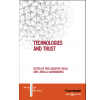Technologies and trust
Synopsis
Released with the Creative Commons License Attribution-NonCommercial-NoDerivatives 3.0 Italia (CC BY-NC-ND 3.0 IT) in the peer reviewed series Media e tecnologie per la didattica
What is trust and how new technologies are changing or affecting the concept of trust?
This publication offers insights from researchers working in educational technology and distance education, collected in the frame of the European FP-7 Marie-Curie People project “Stimulators and inhibitors of a culture of trust in educational interactions assisted by modern information and communication technology”.
The book includes research findings on the concept of trust in a digital world, and provides examples of implications of trust for successful learning experiences in distance education – including the use of virtual learning environments, social technologies, and ePortfolios.
The research goal is to understand how trust has changed or is changing: this is related not only to the modifi cation of the meaning, but also indicators upon which people built their judgements.
In this, technologies have a role, for their impact and for the logics that these entail, as aggregators of artifacts, subjects, systems. As several of the book’s articles stress, technologies are modifying types of interpersonal relations, by replacing face to face channels with digital channels. If communication in many cases is not face to face anymore, indicators on which trust was based are lost. How are these replaced? Which criteria are emerging? Which factors are introduced by technology?
The volume does not try to offer value judgements, but tries to understand trust and proposes reading keys.
The book presents eight articles, and as said, it arises also from research carried out in the frame of an international project, therefore provides works both from Italian researchers, and research scientists from India and Poland.
Downloads


